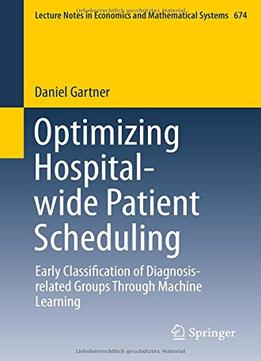
Optimizing Hospital-Wide Patient Scheduling
by Daniel Gartner /
2015 / English / PDF
2.3 MB Download
by Daniel Gartner (Author). Diagnosis-related groups (DRGs) are used in hospitals for the reimbursement of inpatient services. The assignment of a patient to a DRG can be distinguished into billing- and operations-driven DRG classification. The topic of this monograph is operations-driven DRG classification, in which DRGs of inpatients are employed to improve contribution margin-based patient scheduling decisions. In the first part, attribute selection and classification techniques are evaluated in order to increase early DRG classification accuracy. Employing mathematical programming, the hospital-wide flow of elective patients is modelled taking into account DRGs, clinical pathways and scarce hospital resources. The results of the early DRG classification part reveal that a small set of attributes is sufficient in order to substantially improve DRG classification accuracy as compared to the current approach of many hospitals. Moreover, the results of the patient scheduling part reveal that the contribution margin can be increased as compared to current practice. earned his doctoral degree in Operations Management at the TUM School of Management, Technische Universität München, Germany. His research examines optimization problems in health care and machine learning techniques to improve hospital-wide scheduling decisions. Prior to joining TUM he received his university diploma (Master's equivalent) in medical informatics from the University of Heidelberg, Germany, and a M.Sc. in Networks and Information Systems from the Université Claude Bernard Lyon, France.










